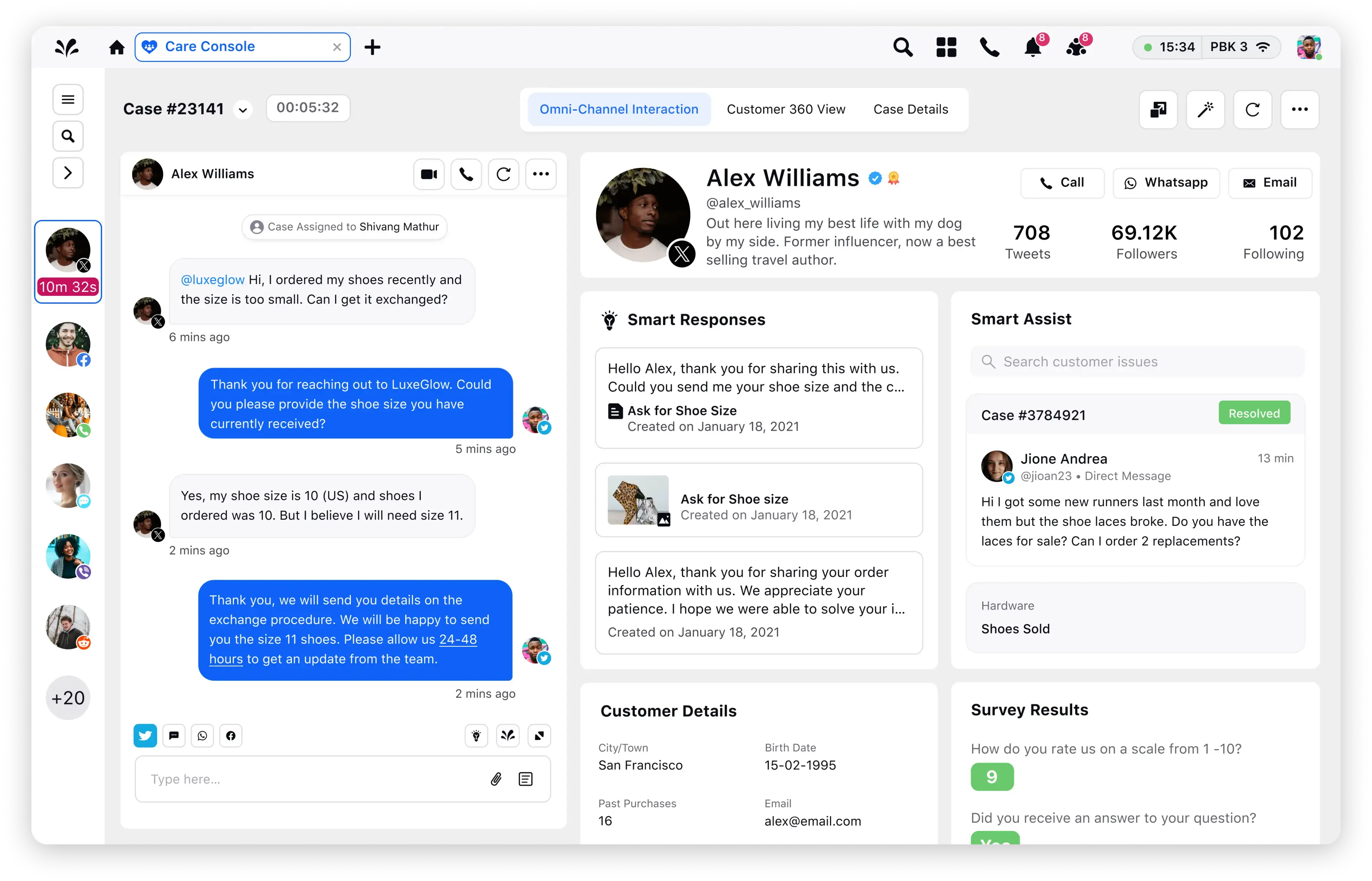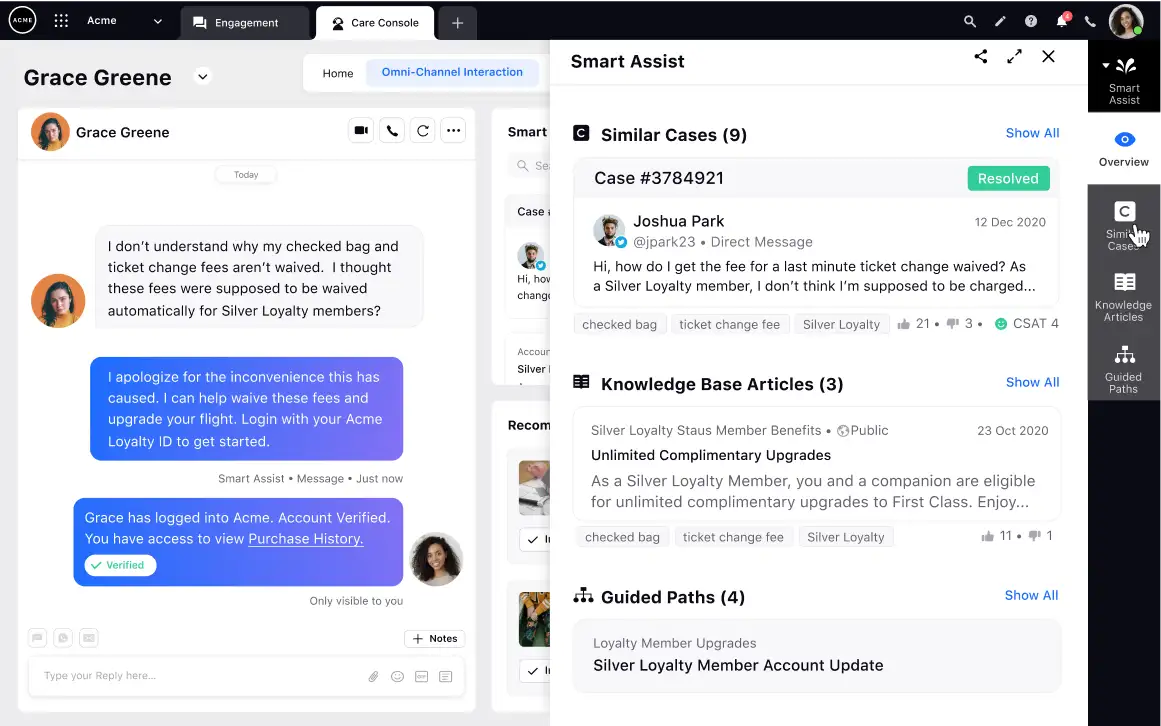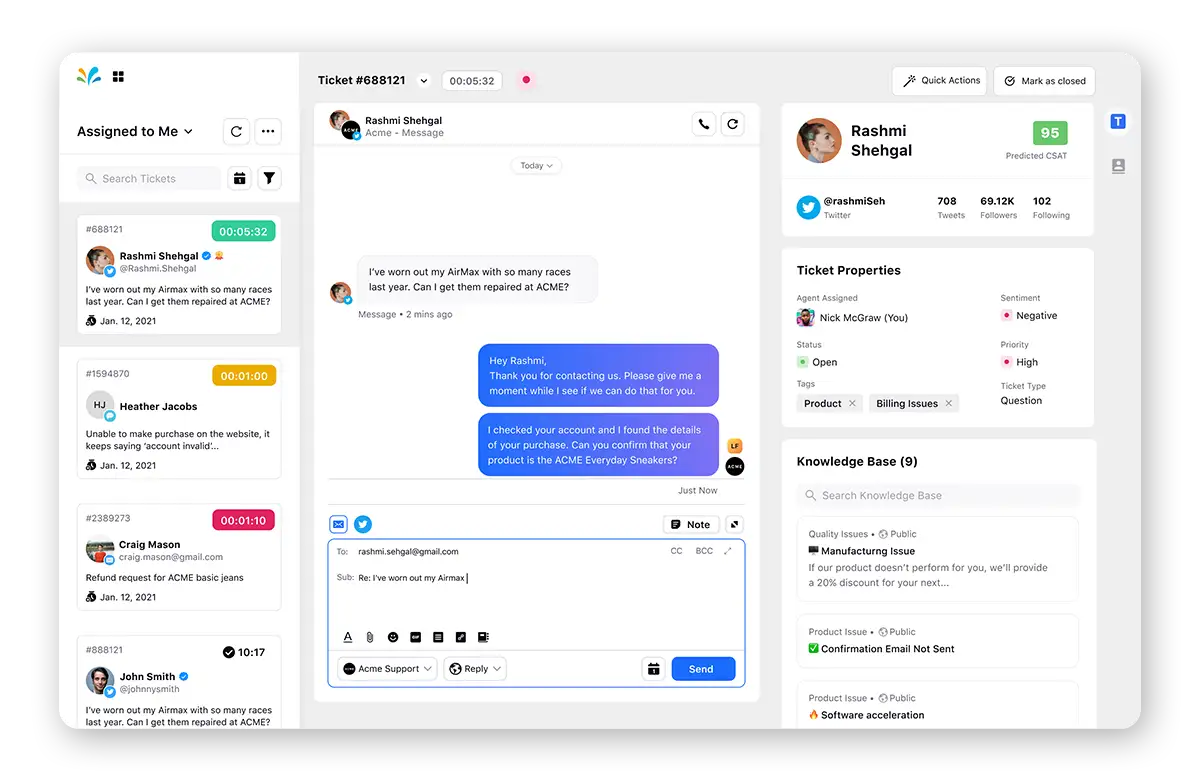The next generation of CCaaS is here
Digital-first customer service, enterprise-scale voice support. Redefine customer service with an AI-powered platform that unifies voice, digital and social channels. Power channel-less interactions and seamless resolution no matter the channel of contact.

8 contact center skills that support agents need in 2023 (and how to develop them)
There are no silver bullets to expunge customer service woes. What makes customer experiences smooth and engaging are the agents and skill sets they bring to the table. Although some skills are intuitive and naturally born, a few of these are products of unabated practice, continuous training, and endless experiences (good, bad, ugly).
Kelly, a contact center manager of a tech company, manages and supervises a small team of 15 agents. Evelyn is a support agent in her team whose job is to support customers across multiple channels. Although Evelyn is hard working and passionate about her work, her performance is subpar when it comes to resolving billing and refund-related customer queries. On top of that, every time she has to collaborate with other teams to gather data, she gets restive and tense. Whenever she needs to ask open-ended questions to customers, the thought itself puts her into quivers. It’s been more than a week now, and Evelyn hasn’t been able to close a refund ticket. This ticket requires her to interact with the finance team and follow up with the customer with tons of open-ended questions. This otherwise gregarious and smart Evelyn is failing to gather important context, skipping the bigger picture and oodles of critical information.
When it comes to improving the overall performance of contact centers, all bets are on support agents. Every day they are up against multiple customer challenges; some wear them out completely. Despite facing these challenges, they do their best to ensure the highest customer satisfaction. Fair to say agents are, in fact, they are superheroes of customer support. But superheroes need superpowers. And as for agents, they need to be armed with ‘super skills’ to do many things within short deadlines. Hate to break it, but simply having the right tools or information at agents’ disposal wouldn’t suffice. So, how can you transform your support agents into support wizards? Let’s find out.
A few critical challenges faced by today's Gen-Z support agents
Agent productivity is blocked by a multitude of tasks and hard deadlines
With insurmountable tickets, multiple tasks, and mind-numbing customer scenarios, your agents always have their hands full. Come hell or high water; they have to take care of each task diligently without sacrificing the quality of customer service and violating service level agreement (SLA).
Burning the candle at both ends, yet no work-life balance
Ask any of your agents about their work-life balance. Don't be surprised if they say there isn't a thing like that in their lives! Because agents are always on the edge of burnout. With too many hard deadlines, cliquey coworkers, screen switching, and unreasonable expectations, they feel overwhelmed, demotivated, and emotionally drained. Worse, the need to work during graveyard shifts and holidays has kept even the bright and best agents from having a healthy work-life balance.
Difficult customers and their endless difficulties
Dealing with difficult customers is always…well, difficult. On the one hand, there is an impatient and demanding customer who wants everything at the drop of a hat and might start rolling their eyes even if delays are in seconds! Such unpleasant episodes drain your agents' energy and time, often making them resent their job as customer care professionals.
Lack of access to information and collaboration between departments
Studies show that agents spend close to 75% of their time searching for customer information, which in turn, increases the chances of SLA violations.And collaborating with different departments within a short time frame is challenging. Either way, if the information is not centralized or accessible to agents when needed, it leaves them with no option but to keep customers on long holds.
Despite these challenges, your agents appear unscathed, always trying to give their best. They deserve a pat on their back because it's not easy to develop a thick skin and save the buttons from being pushed, especially in a grueling contact center environment.
8 contact center skills that every support agent needs in 2023
In the above section, we saw some of the most common challenges faced by support agents. But that's only the tip of the iceberg. The litany of challenges keeps growing with new tickets and customer queries. Besides, avant-garde technology like conversational AI can only do so much. Sure, it can help automate repeat tickets, streamline workload, and complete tasks faster. But it can neither create zeal in agents needed to tackle myriad complex issues nor provide the human element that makes customer interactions empathetic and human. Top-level support skill sets can help agents think on their feet every day.
Read on to understand which skills your agents already have under their belts and which ones need to be developed.
1. Problem-solving and troubleshooting skills
With self-care options taking center stage for most queries, a customer now seeks agents' support only when they are unable to find an appropriate answer via self-serve. And when they do come to an agent, the expectation bar automatically rises. They want more from a human agent.
In fact, according to a Forrester study, as many as 83% of people say that humans better understand their problems and needs and wouldn’t mind sidestepping self-service options to talk to a human agent directly. Since interactions could range from complex to unpredictable, it is important for agents to first identify underlying issues by asking open-ended questions to customers. This helps agents collate enough information before they arrive at a decision. Also, a good problem solver familiar with basic troubleshooting will always be prompt to comprehend customer issues better and spot what's broken in a product.
2. In-depth product knowledge
Now imagine a situation where a customer receives different answers from different agents regarding an issue related to a feature of an app, that’s not working. It’ll certainly spur confusion. Situations like these will not only drive customers away but also make them lose confidence in the products and services, ultimately giving them big-time buyer’s remorse. That said, an agent who is a subject matter expert will comprehend customers' technical issues better and can work faster at resolving their issues at first instance. Moreover, in-depth product knowledge empowers agents to freely communicate the benefits of product features and make difficult conversations less stilted. Dedicated product demo sessions, refreshers, and presentations to agents will enable them to offer up-to-date and accurate information to customers.
Sprinklr's AI analyzes which articles are the most effective at resolving specific issues, then surfaces them in the Agent Console during conversations — so your agents won't have to manually search for key resources and can deliver better answers faster.

3. Attention to detail
As they say, it is the little things in life that can go a long way in making some biggest differences in the future. The same holds true in the field of customer service. A cautious agent, in equal parts, is alert and thoughtful. When agents pay attention to detail or keep track of every word and attribute during a customer interaction, they can easily figure out the root cause of problems. Closely linked with effective communication skills, attention to detail is a necessary trait to have for anyone who's in customer support.
These skills help customer-facing teams learn and extract small yet crucial details without explicitly being mentioned by the customer. Likewise, attention to detail also means observing customers’ emotional quirks and taking notes and documenting anything new in theirCRM and CXM systems.
4. Knowledge retention and information prioritization skills
When loaded with information, humans are bound to forget. According to Hermann Ebbinghaus's Forgetting Curve theory, about 70% of any new information is lost within 24 hours if we don't try to retain it. And clearly, you don't want your agents to forget any of the information they gather during customer interactions. A significant cause of forgetfulness is having too much important information to soak. Besides, agents have to navigate through many screens or channels to find solutions and maintain tons of customer records every day. This not only increases average handling time (AHT) but also elevates the chances of missing a few critical details.
But by leaning on various retention tactics, agents can learn to prioritize and retain vast information related to customers without stressing themselves out. For example, one of the effective ways to retain and recall information is through the chunking method.
This method focuses on picking up smaller bits of information and merging them to form patterns and build connections to boost the recall value. For example, agents can begin by outlining all the specifics gathered during the customer interaction and then breaking down each piece of information into smaller buckets like cause of the problem, frequency of calls, and level of complexity.
5. Levelheadedness, patience, resilience, and flexibility
While it may seem like a given, these skills are the linchpins of customer service and support. There’s no doubt that agents have to deal with the highest number of angry and frustrated customers compared to other departments. Some customers berate even after finding appropriate solutions from agents. Resilience, patience, and self-control are those backstage heroes that help support agents cope with complicated interactions by buffering negative or haywire situations. Knowing when to go that extra mile to ease tense customer situations or when to take a step back can prevent many support mishaps from happening.
6. Multitasking and task-switching skills
Undeniably multitasking is an inevitable part of any customer care agent’s daily schedule. Today’s Gen Z agents are expected to juggle and manage several complex tasks simultaneously. From guiding customers over calls or live chat and responding to emails to jotting down important details like case IDs and liaising with different departments.
Not just that. Considering the time constraints, agents have to do everything in a hurry — collate information from internal systems, refer to knowledge bases, switch between screens, and stay focused amidst all distractions. And if agents fail to do so, they are bound to succumb to the work pressure sooner or later. Being adept at task switching and multitasking can help support agents do multiple tasks at once without losing concentration, alertness, and quality. In Joss Whedon’s words, “The secret to multitasking is that it isn’t actually multitasking. It’s just extreme focus and organization”.
Sprinklr's unified Care Console is a Customer Care Agent facing software that aids agents resolve customer queries via chat and call over 10+ social and messaging channels like X, formerly Twitter, Facebook, WhatsApp, etc.

7. Responsiveness and active listening skills
According to Forrester, 71 percent of customers believe that the most crucial thing a brand can do with regard to customer service is to value customers' time. After all, no customer wants to be put on long holds. Another study reveals that 46% of customers expect a response to social media complaints within an hour.
The best agents value customers' time and not only put customers' needs first but also respond to their requests in a timely manner. To ensure immediate responses to customers, agents must be aware of when to use canned responses, email templates, or a knowledge base, depending on the complexity of the query. They should know how to strike the right balance between speed and quality if surrounded by complicated queries.
Sprinklr's AI-based capability suggests pre-composed canned responses to agents to make their workflow efficient.

Another way to improve customer responsiveness is by observing customers' tone and choice of words in each interaction and personalizing conversations accordingly. Dr. Thomas Gordon reiterates the importance of active listening and responsiveness when he says: "People's problems are like onions — they come in layers. Only after the outside layers are peeled off do they get down to the core problem. Sometimes people know what the real problem is but are afraid to start there; more often, they are not even aware of what is underneath. When a person starts out talking to you about some bothersome problem, you generally hear only the 'presenting problem.' Active listening effectively facilitates the help”.
8. Excellent collaboration skills
Collaboration is the foundation of all support processes. Working collaboratively with other customer-facing teams makes it easier to resolve complex customer issues on time.
For example, when an agent gets a customer query related to a product replacement, they might have to get in touch with the logistics team to check the product's availability in the warehouse. And if the product is unavailable, agents can collaborate with the logistics team and find an alternative that carries the same features as the requested product. However, to do that, agents must know how to work seamlessly with each team, collate relevant information and ensure faster resolution times. Interacting with customer-facing teams regularly can also help agents better understand the most common customer challenges.
Sprinklr's Agent Desktop brings relevant data, historical knowledge, and communication tools together in one place and simplifies collaboration by enabling easy sharing of case-specific details between team members.

The brave new world of customer support needs superior support skills
While some support skills like resilience and active listening can be relatively innate or intuitive, a few skills such as product knowledge and collaboration can be nurtured or retained only through continuous learning and practice. And first, acquiring these skill sets can be a bit overwhelming for your agents. But if you provide a conducive environment and sign them up for different training programs and courses, you will experience a sharp rise in their performance as well as productivity levels.
Here are some important CX learning and certification programs that will help your agents fill in their knowledge gaps and allow them to explore different facets of customer experience.

